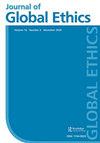Khader’s minimalist, pluralist universalism
Q2 Arts and Humanities
引用次数: 0
Abstract
ABSTRACT Serene Khader’s effort to develop a decolonized approach to transnational feminism takes a helpfully nonideal approach. Much of decolonial theory has criticized universalism in order to espouse pluralism. Khader attempts to develop a form of minimalist universalism compatible with a significant dose of pluralism in regard to how we understand liberation from gender-based forms of oppression, and she effectively shows how the nonideal, meliorative approach can do this. I address three issues here: (1) the serious challenge her universalist account poses to critical theory and some other trends in continental philosophy; (2) the persuasive analysis of, approach to, and critique that she makes of ‘gender role eliminativism’ and (3) the epistemic and dialogic questions left remaining in her defense of feminist universalism, in relation to who can theoretically formulate the universal.卡德尔的极简主义,多元的普遍主义
塞勒·卡德尔(Serene Khader)致力于发展一种非殖民化的跨国女权主义方法,这是一种有益的非理想方法。许多非殖民化理论为了拥护多元主义而批判普遍主义。关于我们如何理解从基于性别的压迫形式中解放出来,Khader试图发展一种极简主义的普遍主义形式,并与多元主义相兼容,她有效地展示了非理想的改良方法是如何做到这一点的。我在这里提出三个问题:(1)她的普遍主义描述对批判理论和大陆哲学的其他一些趋势构成了严重的挑战;(2)她对“性别角色消除主义”所做的有说服力的分析、方法和批评;(3)她为女权主义普遍主义辩护时留下的认识论和对话问题,涉及到谁可以从理论上阐述普遍性。
本文章由计算机程序翻译,如有差异,请以英文原文为准。
求助全文
约1分钟内获得全文
求助全文

 求助内容:
求助内容: 应助结果提醒方式:
应助结果提醒方式:


